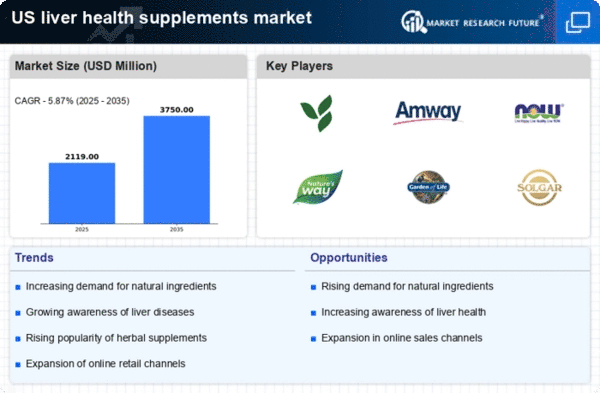Increasing Incidence of Liver Diseases
The rising prevalence of liver diseases in the US is a critical driver for the liver health-supplements market. According to the CDC, liver disease is among the leading causes of morbidity and mortality, with conditions such as fatty liver disease and hepatitis affecting millions. This alarming trend has prompted consumers to seek preventive measures, including dietary supplements aimed at enhancing liver function. The liver health-supplements market is likely to benefit from this growing health concern, as individuals increasingly turn to supplements as a proactive approach to liver health. Furthermore, the market is projected to grow at a CAGR of approximately 7% over the next five years, reflecting the heightened demand for products that support liver health.
Rising Demand for Personalized Nutrition
The trend towards personalized nutrition is emerging as a significant driver for the liver health-supplements market. Consumers are increasingly seeking tailored health solutions that cater to their specific needs, including liver health. This shift is prompting manufacturers to develop customized supplements that address individual health concerns, such as genetic predispositions to liver diseases or lifestyle factors. The ability to offer personalized products may enhance consumer loyalty and satisfaction, thereby driving market growth. As the demand for personalized nutrition continues to rise, the liver health-supplements market could see substantial innovation and expansion, potentially reaching a market size of $3 billion by 2027.
Growing Interest in Preventive Healthcare
The shift towards preventive healthcare is significantly influencing the liver health-supplements market. Consumers are increasingly prioritizing wellness and preventive measures over reactive treatments. This trend is reflected in the rising sales of supplements that claim to support liver health, as individuals seek to mitigate risks associated with liver diseases. The market is likely to see a surge in demand for products that promote liver detoxification and overall health. Additionally, the increasing focus on holistic health approaches may lead to a broader acceptance of liver health supplements as part of daily wellness routines, further propelling market growth.
Regulatory Support for Dietary Supplements
Regulatory frameworks in the US are evolving to support the liver health-supplements market. The FDA has established guidelines that facilitate the approval and marketing of dietary supplements, which encourages manufacturers to innovate and expand their product lines. This regulatory environment not only enhances consumer trust but also stimulates market growth by ensuring that products meet safety and efficacy standards. As a result, companies are more likely to invest in research and development, leading to a wider array of liver health supplements available to consumers. The market is expected to see an influx of new products, potentially increasing its value to over $2 billion by 2026.
Influence of Social Media and Health Trends
Social media platforms play a pivotal role in shaping consumer perceptions and trends within the liver health-supplements market. Influencers and health advocates frequently promote liver health supplements, creating awareness and driving consumer interest. This digital marketing strategy appears to resonate particularly well with younger demographics, who are more inclined to explore health products endorsed by trusted figures. As a result, the market is likely to experience increased visibility and sales, particularly among millennials and Gen Z consumers. The impact of social media on purchasing decisions could potentially lead to a market expansion, with projections indicating a growth rate of around 8% annually.
























Leave a Comment